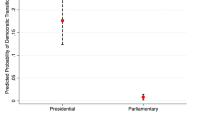Abstract
Who governs democratic regimes? The empirical analyses presented in this book provides a fairly clear answer to the question we raised in this book. The cabinets of these countries are composed by a majority of party-men and party-women, but also by a significant proportion of non-partisan technocrats. The recruitment of ministers is thus far more varied than the party government model expected.
The limited ability of contemporary party leadership to provide a sufficiently strong pool of qualified personnel to face the challenges of policy-making and the search by strong monocratic heads of the executive for competent and personally loyal ministers are probably the two factors which, combined, provide the best explanation. To some extent the phenomenon is due to long-term processes of change, but short-term critical episodes can significantly enhance these effects. If we want to understand the composition of cabinets the party government model is not sufficient anymore. It must be complemented with other models based on different political criteria. This obviously raises serious questions about the outcomes of this situation and about its potential impact upon the quality of democracy.
Access this chapter
Tax calculation will be finalised at checkout
Purchases are for personal use only
Similar content being viewed by others
References
Alexiadou, D., & Gunaydin, H. (2015). Selection the Righ Minister: The Appoitments and Policy effects of Technocrat and Expert Ministers. Paper presented at the Annual European Political Science Association Conference, Vienna.
Amorim Neto, O., & Samuels, D. (2010). Democratic Regimes and Cabinet Politics: A Global Perspective. RIEC-Revista Ibero Americana de Estudos Legislativos, 1, 10–23.
Amorim Neto, O., & Strøm, K. (2006). Breaking the Parliamentary Chain of Delegation: Presidents and Non-partisan Cabinet Members in European Democracies. British Journal of Political Science, 36, 619–643.
Blondel, J., & Thiébault, J. L. (Eds.). (1991). The Profession of Government Minister. London: Macmillan.
Blondel, J., & Cotta, M. (Eds.). (2000). The Nature of Party Government. London: Macmillan.
Cotta, M. (2000). Conclusion: From the Simple World of Party Government to a More Complex View of Party-Government Relationships. In J. Blondel & M. Cotta (Eds.), The Nature of Party Government (pp. 196–222). London: Macmillan.
Cotta, M. (2015). Partitocracy: Parties and Their Critics in Italian Political Life. In E. Jones & G. Pasquino (Eds.), The Oxford Handbook of Italian Politics (pp. 41–52). Oxford: Oxford University Press.
Cotta, M., & Verzichelli, L. (2007). Political Institutions of Italy. Oxford: Oxford University Press.
Dalton, R. J., & Wattenberg, M. P. (Eds.). (2000). Parties Without Partisans: Political Change in Advanced Industrial Democracies. Oxford; New York: Oxford University Press.
De Winter, L. (1991). Parliamentary and Party Pathways to the Cabinet. In J. Blondel & J. L. Thiébault (Eds.), The Profession of Government Ministers (pp. 44–69). London: Macmillan.
Duverger, M. (1980). A New Political System Model: Semi-presidential Government. European Journal of Political Research, 8, 165–187.
Elgie, R. (1999). The Politics of Semi-presidentialism. In R. Elgie (Ed.), Semi-presidentialism in Europe (pp. 1–21). Oxford: Oxford University Press.
Huntington, S. (1991). The Third Wave: Democratization in the Late Twentieth Century. Norman: University of Oklahoma Press.
Katz, R. (1986). Party Government: A Rationalistic Conception. In F. G. Castles & R. Wildenmann (Eds.), Visions and Realities of Party Government (pp. 31–71). Berlin: de Gruyter.
Poggi, G. (1978). The Development of the Modern State: A Sociological Introduction. Stanford, CA: Stanford University Press.
Poguntke, T., & Webb, P. (Eds.). (2005). The Presidentialization of Politics: A Comparative Studiy of Modern Democracies. Oxford: Oxford University Press.
Protsyk, O. (2006). Intra-executive Competition Between President and Prime Minister: Patterns of Institutional Conflict and Co-operation Under Semi-presidentialism. Political Studies, 54, 219–244.
Sartori, G. (1994). Comparative Constitutional Engineering: An Inquiry into Structures, Incentives and Outcomes. Basingstoke: Macmillan.
Siaroff, A. (2003). Comparative Presidencies: The Inadequacy of the Presidential, Semi-presidential and Parliamentary Distinction. European Journal of Political Research, 42, 287–312.
Strøm, K. (2000a). Delegation and Accountability in Parliamentary Democracies. European Journal of Political Research, 37, 261–289.
Tilly, C. (Ed.). (1975). The Formation of National States in Western Europe. Princeton, NJ: Princeton University Press.
Tilly, C. (2007). Democracy. Cambridge: Cambridge University Press.
Author information
Authors and Affiliations
Editor information
Editors and Affiliations
Rights and permissions
Copyright information
© 2018 The Author(s)
About this chapter
Cite this chapter
Cotta, M. (2018). Technocratic Government Versus Party Government? Non-partisan Ministers and the Changing Parameters of Political Leadership in European Democracies. In: Costa Pinto, A., Cotta, M., Tavares de Almeida, P. (eds) Technocratic Ministers and Political Leadership in European Democracies. Palgrave Studies in Political Leadership. Palgrave Macmillan, Cham. https://doi.org/10.1007/978-3-319-62313-9_10
Download citation
DOI: https://doi.org/10.1007/978-3-319-62313-9_10
Published:
Publisher Name: Palgrave Macmillan, Cham
Print ISBN: 978-3-319-62312-2
Online ISBN: 978-3-319-62313-9
eBook Packages: Political Science and International StudiesPolitical Science and International Studies (R0)




